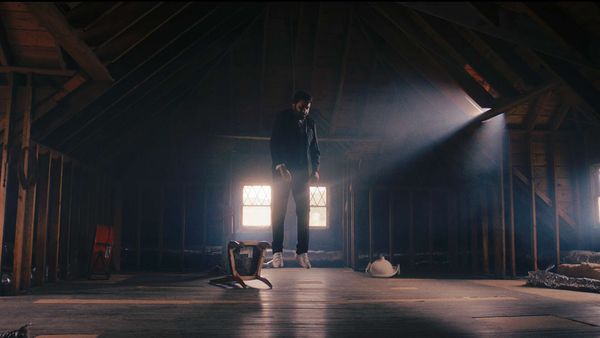Eye For Film >> Movies >> The Deserving (2024) Film Review
The Deserving
Reviewed by: Jennie Kermode

Muteness in films is usually present as a plot device. One of the most striking things about The Deserving is that, story-wise, it could work in much the same way without it. The tone. however, would be completely different. This is a quiet film, and not just because its central character, Karter (Venkat Sai Gunda), doesn’t speak. It’s hushed and understated in terms of camera and character movement, colour choices and use of space. It very effectively conveys the sense of distance from the rest of the world that muteness can create – although, of course, most mute people, if they feel that at all, live with it very differently.
It’s established early on, from a conversation and from music played in a kitchen, that Karter is not deaf. His muteness seems to be trauma-induced, and his traumatic history is gradually filled in as the film develops. Positioning a model who visits his house for a photoshoot and struggles to interpret his gestures, he exhibits a gentleness which at first seems calming and professional, but lingers just a little too long. It doesn’t seem sexual so much as comfort-seeking, as if he perceives her as a maternal figure. it is, of course, still overstepping boundaries, and when she reacts negatively to it, something else is sparked within him, with bloody results.

Is it his fault? Should we feel sympathy? The film appears to answer yes to both questions, but with a caveat on the latter. Karter has yet to acknowledge the depth of his own responsibility for his actions. A lot of people live with trauma, a later comment implies. They still make choices. Karter’s choice is to try to stop himself from killing more women by taking his own life – but is that enough? When he goes upstairs to the attic to do the deed, there is a sudden, loud knocking at the front door, and and he is impelled backwards, towards life. There is a stranger at the door, a loudly dressed, brash woman who announces herself as Lucy Hill (Simone Stadler) and pressures him to invite her in. She, like her predecessor, is supposedly looking to be photographed, but as she makes him more and more uncomfortable, Karter realises that she might have another agenda – and then things get very strange indeed.
There are not so many ideas in the second half of the film, and one can’t escape the feeling that, having established its premise, it doesn’t really know where to go, but this is made up for by the superb central performance and by Koka Singh Arora’s intelligent approach to direction. Though his inexperience as a writer is notable (balanced by a significant degree of raw talent), it’s remarkable what he has managed to achieve as a director in this, his début film. There’s a gracefulness, an ease about the way he frames events which lulls viewers into a false sense of security, and which serves as a wonderful storytelling tool. Early on, we watch Karter go to a fair bit of trouble to prepare dinner just for himself, sitting at the end of a large dining room table to eat it, and the camera absently drifts down to an empty chair. The house is impeccably clean, which adds to the sense of space and thus to our understanding of Karter’s isolation.
Complementing this is the set decoration. The house is full of handsome wooden furniture, much of it bearing Indian motifs and thereby suggesting the continued controlling presence of Karter’s overbearing, violent father (played by the director). There is very little there to speak to Karter’s own personality. Nga Weng Chio’s soft, lonely string score is also deserving of mention, resisting the Bernard Herrmann motif beloved of horror film directors and instead contributing to an overall mournful tone. We do not need to forgive Karter to recognise the tragedy of the situation.
“So tragic what happened to your mother,” says Lucy. Does she realise how hard she’s pushing? Is this how he has always felt when faced with the outside world? Gunda builds his character in a very self contained but delicate way. Karter dresses carefully, thoughtfully, when planning to die, but as he brushes it, his hair just won’t sit right. He remembers his frightened younger self, but it is too late to change anything. The past – all of it – refuses to let him go.
Reviewed on: 29 Sep 2024
















